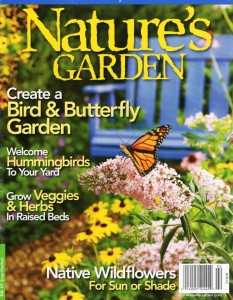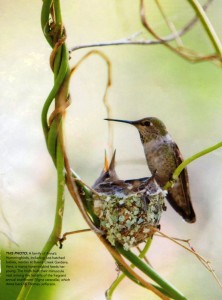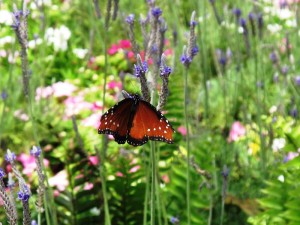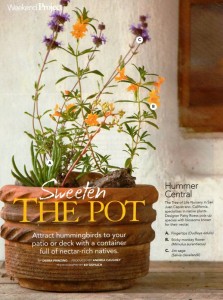Food for the Wild: best plants for hummingbirds & butterflies
June 16th, 2010
ATTENTION Better Homes & Gardens readers! Thank you for visiting! Click here to see my gallery of circles, orbs, spheres, and globes in the garden.
 The Summer 2010 issue of Nature’s Garden (a Better Homes & Gardens title edited by the very talented Jane Austin McKeon) features two articles by me. Here’s a sneak peek at those stories.
The Summer 2010 issue of Nature’s Garden (a Better Homes & Gardens title edited by the very talented Jane Austin McKeon) features two articles by me. Here’s a sneak peek at those stories.
The fist one, titled “Got Nectar?”, is about naturalists and nursery owners Steve and Donna Brigham.
The story, produced by Andrea Caughey and photographed by Ed Gohlich, describes how the Brighams created a 1/4-acre Hummingbird and Butterfly Garden at their former nursery in the San Diego area.
Buena Creek Gardens is now owned by Steve and Shari Matteson, and you can visit year-round for a great selection of native and wildlife-friendly plants. You can read the full article, here.
If you’re inspired to attract more hummingbirds and butterflies to your backyard, take a gander down these two lists, shared by Steve Brigham.
You can meet Steve and hear him lecture in Pasadena on Septemer 25th, as part of Pacific Horticulture’s symposium, “Style and Whimsy in the Sustainable Garden.” Steve will speak on “Attracting Birds & Butterflies to Your Garden and Keeping Them There.”
”] Top Nectar Plants for Hummers
Top Nectar Plants for Hummers
Brazilian verbena (Verbena bonariensis); 3-6 ft., summer
*Butterfly bush (Buddleja davidii and hybrids); 3-10 ft., spring and summer
Bottlebrush (Callistemon citrinus and hybrids); 10-15 ft., spring and summer
Coral bell (Heuchera sp.); 1-2 ft., spring to fall
Firecracker flower or cigar plant (Cuphea ignea or C. llavea); 1-3 ft., spring and summer
*Flowering sage (Salvia sp.); countless varieties in perennial (1-3 ft.) and shrub (2-5 ft.) forms, spring to fall
Fuchsia (Fuchsia x hybrida), 3-6 ft. or trailing type for hanging basket, summer
Grevillea (Grevillea sp.), shrub form (3-8 ft.), summer
*Milkweed (Asclepias tuberosa), 3 ft., summer
Penstemon (Penstemon sp. and hybrids), 1-2 ft., spring to fall
Peruvian lily (Alstroemeria hybrids), 1-2 ft., summer
Torch lily (Kniphofia hybrids), 2-5 ft., summer to fall
Top Nectar Plants for Butterflies
Butterfly flower (Gaura lindheimeri), 2-4 ft, spring to fall
Gloriosa daisy (Rudbeckia hirta), 3-4 ft., summer
Heliotrope (Heliotropium arborescens), 3-4 ft., summer
Jupiter’s beard (Centranthus ruber), 3 ft., summer and fall
Lantana (Lantana hybrids), 2-5 ft., summer
Marigold (Tagetescultivars), 2-4 ft., spring and summer
Mexican sunflower (Tithonia rotundifolia), 2-3 ft., summer
Pincushion flower (Scabiosa columbaria), 2 ft., summer
Purple coneflower (Echinacea purpurea), 3-4 ft., summer
Shasta daisy (Chrysanthemum maximum), 2-4 ft., summer and fall
Tickseed (Coreopsis grandiflora and cultivars), 1-2 ft., summer
Yarrow (Achillea millefolium and hybrids), 2 ft., summer
Here’s how to find Buena Creek Gardens: 418 Buena Creek Rd., San Marcos, California, 760-744-2810; www.buenacreekgardens.com
My second story is part of the magazine’s “Weekend Project” – an easy-to-accomplish design idea created by Patty Roess of the Tree of Life Nursery in San Juan Capistrano, California.
“Sweeten the Pot” includes all the steps you need to attract hummingbirds to your patio or deck with a container full of nectar-rich native plants.
Here are the ingredients:
- a decorative container, at least 18 inches in diameter, to accomodate three plants
- broken pottery shards
- good-quality (organic) potting soil
- native plants with features hummingbirds appreciate (tubular blooms, hot or bright colors, lots of nectar); Tree of Life suggests Dudleya edulis, Mimulus aurantiacus and Salvia clevelandii.
- natural accents, such as stones and branches
1. Use one or more pieces of broken pottery to cover the drainage hole.
2. Fill approximately 1/4 to 1/3 of the container with high-quality potting soil. Tree of Life Nursery uses a special fast-draining mix developed for native plants. To make your own mix, combine equal parts regular potting soil and commercial potting mix formulated for desert or cactus plants.
3. Arrange plants in the container, placing the tallest plant toward the back. Add soil until it reaches 1/2- to 1-inch below the pot’s rim. Add decorative accents, such as mementos you have gathered in nature. Water thoroughly. In warm climates, you can transplant these California natives to a sunny garden as soon as they finish blooming.
Enjoy!











June 17th, 2010 at 1:21 pm
[…] Debra Prinzing » Blog Archive » Food for the Wild: best plants for hummingbirds & bu… […]
June 18th, 2010 at 7:51 am
Thank you for letting us know not to miss this issue!